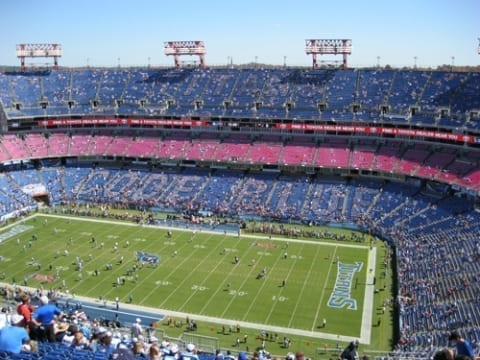LP Field Makes the Right Connections with Dante

LP Field, Nashville, TN United States
Description
LP Field in Nashville is the home stadium for NFL’s Tennessee Titans. The 69,798 seat stadium is also host to Tennessee State University Tigers, the annual Music City Bowl college football game, and is a multi-purpose venue booked for large concerts and entertainment events. LP Field also offers public meeting facilities for events, meetings and other gatherings.
Last year, consulting firm WJHW teamed up with systems integrators AVI-SPL and Morris Light & Sound for a comprehensive AV systems integration project that included a networked audio system, HD scoreboards and video control room upgrades. The audio system overhaul established a Dante network inside the bowl – a decision that sharply reduced project costs.
Challenge
The audio design included plans for 12 audio equipment rooms around the venue housing digital signal processing and amplification. The equipment rooms today receive audio from multiple origination points, including a live performance stage, before networking audio to many loudspeaker zones. Early plans called for fiber connections to support digital audio transmission to and from the equipment rooms, but minor budgetary concerns triggered a strategy change.
“The original design called for standard MADI products to move digital audio around the building over fiber, instead of using an Ethernet transport protocol,” said Mark Graham, associate for WJHW. “Our chief concern was that the networking technology under consideration was slowly becoming obsolete. Then, budget challenges had us revisit the idea of incorporating digital audio transport into the DSP solution, instead of using a standalone system. That’s when we took a closer look at Dante.”
The revised plans soon added Dante networking to the mix, incorporated within a Yamaha M7CL-32 digital mixing console using the Dante-MY16-AUD card and Peavey MediaMatrix NION digital signal processors. This simplifies distribution from the live stage to the mixing room before fanning out to the audio equipment rooms.
Solution
Graham estimates that Dante reduced installation costs by $120,000 in comparison to using MADI as a separate, non-networkable digital audio transport solution.
The Dante network was first established to process audio “at the edge of the network” for each loudspeaker zone, with NIONs in the equipment rooms receiving, processing and distributing audio. However, Dante proved especially useful for the audio equipment room under the stage, where live sound mixing takes place.
Initially, Graham and his team ran a few analog lines from the stage to the equipment room below. The team soon added a Dante-MY16-AUD card to the main stadium Yamaha console, enabling a shift to an IP audio transport.
“We took an AES output from the stage console into a NION, and used the Dante capability that was already there to send the streams back to the control room and out to the rest of the system,” said Graham. “It was easy to accommodate the expansion since Dante was installed across so many areas of the venue. It was all about making the right connections and opening new distribution paths.”
Graham is especially impressed with the flexibility and evolution of Dante as a reliable transport solution – a benefit that he views as timely given the AV and IT convergence happening across the industry.
AV systems are more networked today, which partially shifts the integrator’s focus to accommodating video, audio and control data on the network,” said Graham. “The advances in the number of products, manufacturers and licensees that Dante supports makes our job easier.”
Benefits and Savings
- Simplified audio over IP networking
- Significant cost savings compared to dedicated, non-networkable audio distribution
- Reliable architecture accommodates AV and IT convergence



